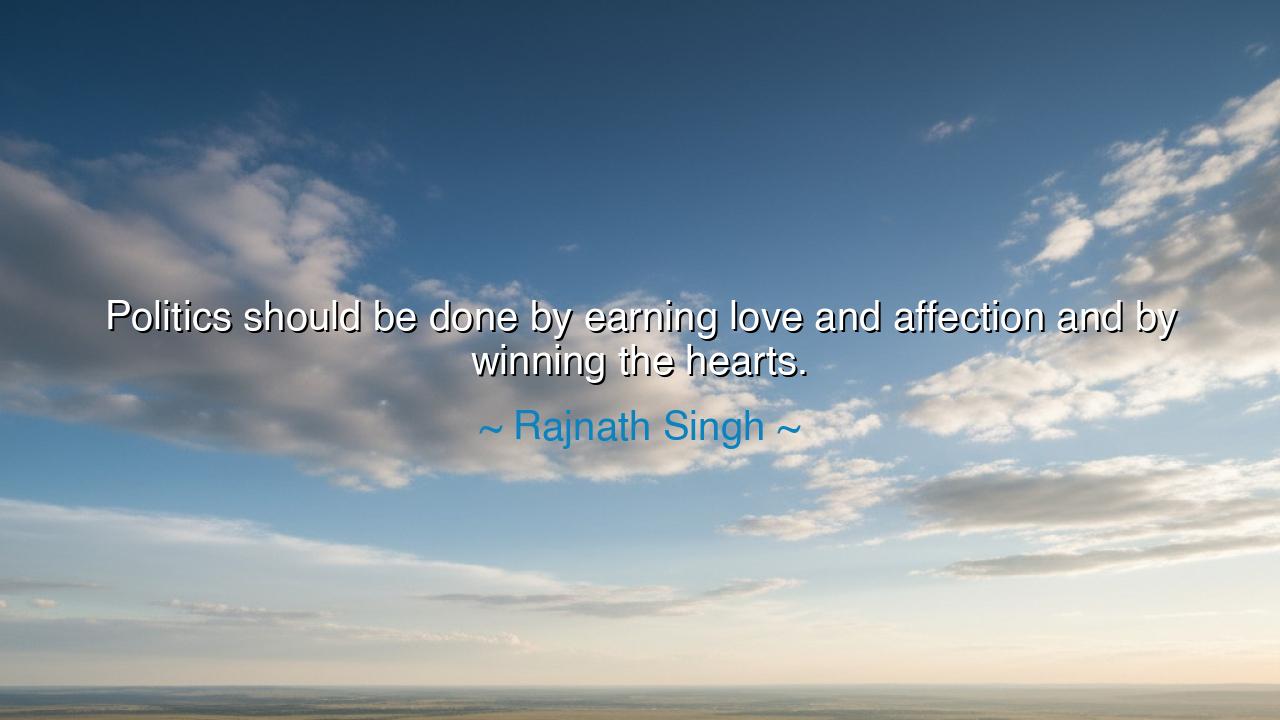
Politics should be done by earning love and affection and by






The words of Rajnath Singh — “Politics should be done by earning love and affection and by winning the hearts” — echo with the wisdom of the ancients. For power gained by fear is fragile, but power rooted in the hearts of the people endures like the oak tree in the storm. This teaching reminds us that true leadership is not the art of domination, but of devotion — not the grasping of thrones, but the weaving of bonds between ruler and ruled.
In the annals of history, many rulers sought obedience through the sword, yet their reigns fell into dust. Consider the tale of Ashoka, the mighty emperor of India. In the beginning, he waged cruel wars, painting the land with blood. But the cries of the fallen pierced his soul, and he turned instead to the path of compassion. By spreading the message of dharma, by building roads, hospitals, and wells, he won not just territories, but the love of his people. Thus, his empire was remembered not for conquest, but for justice and mercy.
The saying of Singh also stands as a rebuke to the coldness of mere strategy. Politics, when stripped of affection, becomes a machine of cruelty — efficient, perhaps, but devoid of soul. History warns us of leaders who forgot this truth: their names are cursed, their statues toppled, their legacies stained. But those who sought the hearts of their people — leaders like Nelson Mandela, who forgave his jailers and embraced reconciliation — they live forever in the gratitude of nations.
To win love is not weakness, but the highest strength. It demands patience, humility, and the courage to serve rather than to command. Such rulers walk among their people not as masters, but as guardians, and the people in return lift them higher than armies ever could. In this lies the secret of lasting power: when hearts are freely given, authority cannot be broken.
Let future generations inscribe this wisdom upon their souls: that the greatness of politics lies not in fear, nor in cunning, but in the gentle yet unshakable bond of affection. For empires built on fear crumble, but nations founded upon the hearts of their people rise like the dawn, radiant and eternal.






DADuy Anh
There’s something deeply personal about Singh’s quote, as it seems to call for politicians to connect with people on an emotional level. But in today’s world of social media and public scrutiny, is it still possible to lead with love and affection? How do we maintain political integrity while also appealing to the hearts of the public? Can a leader be both compassionate and effective, or does one have to sacrifice the other?
CVThuy Chi Vu
Singh’s perspective feels like a call for more human-centered politics, which I find refreshing. In many ways, it aligns with the idea that leadership should come from a place of service, not control. But is this approach effective in a competitive political world? Do voters and politicians themselves expect more than love and affection—perhaps power, security, or ideologies? What do you think is the most important factor in earning support in politics?
ALMai Anh Le
I appreciate the sentiment behind Singh’s words, but I question whether it’s realistic. In an era of political polarization, can earning love and affection truly lead to effective governance? Isn't there also a need for tough decisions and compromises? Can we balance compassion with pragmatism in politics, or does the pressure of office require a more transactional approach to leadership that may not always align with winning hearts?
Tthei
Singh’s quote is a beautiful reminder that politics isn’t just about power, but about people. It emphasizes compassion, empathy, and understanding—qualities that seem to be missing in much of today’s political environment. But I wonder, is it really possible to win hearts in politics when power dynamics are so entrenched? Can love and affection truly drive political decisions, or is it simply idealistic in today’s divided world?